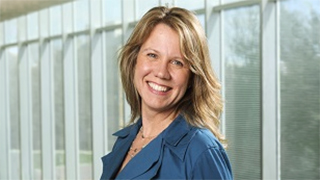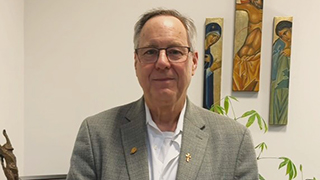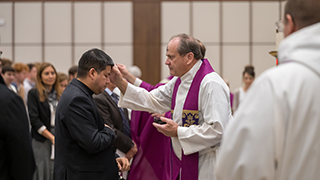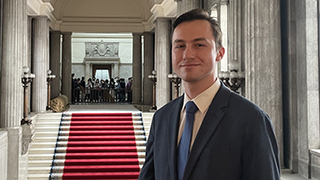Crusader for a Cause: How Nick Scalera ’63 Stood Up to Authority and Helped the Less Fortunate
Monday, November 27, 2023
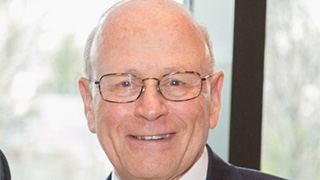
Nick Scalera '63.
Seton Hall alumnus Nick Scalera grew up in an Italian neighborhood in Newark in the ’40s and ’50s, the only child of a working-class man and a homemaker. He attended Garfield public grammar school, his parents continually impressing upon him the importance of getting a good education and eventually earning a college degree—something neither of them possessed.
One day, when Miss O’Callahan, a notorious taskmaster in the 7th grade, called him to her desk after class, he was worried.
"Oh no!" thought young Nick. "Am I in trouble?"
She gave him a note to bring home to his father. A note to his mother was one thing; a note to his father was grave, indeed. The boy carried home the sealed envelope, fretting over what might be inside. "Oh no!" thought Nick. "What did I do now?!"
When he got home, he handed it to his mother. "Can’t you open it?" he begged. "We could glue it back together after you read it! Please!"
His mother kept the moral high ground; she would do nothing of the sort.
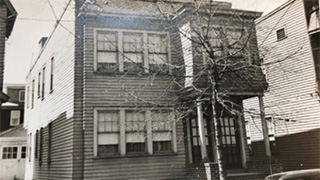
Nick's childhood home in Newark, NJ.
Nick’s father finally came home and Nick had to wait until dinner was finished before his father carefully tore open the envelope along its edge and read the contents.
Nick was not in trouble; nothing could be further from the truth. Miss O’Callahan wanted Nick’s parents to appeal to the grammar school principal to allow Nick to skip ahead a half year while in 7th grade so he could graduate in June and apply to Seton Hall Preparatory School.
None of the Scaleras knew very much about Seton Hall Preparatory School, but Nick felt it had to be something good. When his parents looked into it, they were both excited and worried: the cost was going to be an obstacle.
On the day Nick graduated from grammar school, his extended family was gathered to celebrate. His father stopped the festivities and said he wanted to talk to Nick.
His father started by reminding everyone that the family did not have a lot of money. But then he announced that he and Nick’s mother would do everything in their power to send Nick to Seton Hall Prep.
Nick jumped for joy, hugging and kissing his parents. "Everybody was crying," Nick recalled. "My grandmother was crying. Italians cry when they’re happy, cry when they’re sad, and in-between."
Nick’s life was headed on a new tangent: onward, upward, forward. He would henceforth be proudly called by his father "Lord Seton."
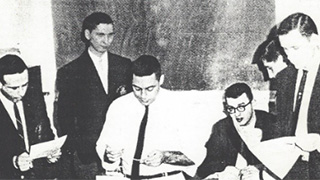
Nick chairing a meeting as Editor-in-Chief of "The Setonian" with editorial staff members Walter Jablonski, Rocco Di Pietro, Victor Librizzi, and two faculty members.
As with many young men, Nick’s four years at Seton Hall Prep led to four years at Seton Hall University. The physical location of the high school on the University campus encouraged aspirational students to advance their education to the college level in an environment they were comfortable with.
At Seton Hall University Nick developed an affinity for journalism. He became editor of The Setonian and found himself, in the early 60s, embroiled in one of the foremost debates on campus.
"I decided it was time for Seton Hall to admit women," Nick recalls. "I also was junior class representative to the student council, so I introduced a motion to hold a plebiscite to see how students felt about going co-ed."
On the day of the vote, Nick ran a front-page editorial with a banner headline: 'Vote Yes Coeducation.' He helped spread thousands of copies across campus, then returned to the press office.
When Nick returned to The Setonian office, the staff looked nervous. They said Msgr. Fleming was furious and wanted to see Nick in his office. Msgr. Edward Fleming was, at the time, the executive vice president of the University and would in 1969 be elevated to the presidency.
Nick took a deep breath in and proceeded to his office. According to Nick, the Monsignor stood up and shook the copy of The Setonian in his fist, shouting that Seton Hall would never be a co-educational institution.
"With all due respect, Monsignor," replied Nick, "there are already women nursing students on campus taking classes with us—" The Monsignor was having none of it. He banished Nick from his office.
"I thought, oh my God, I’m going to be expelled!" Nick recalls. "What am I going to tell my father?!"
Nick never got to witness the full inclusion of women at Seton Hall. But, six years
later, in 1968, Msgr. Fleming’s prediction failed when the University went co-ed,
under his leadership.
From Seton Hall, Nick went on to earn a master’s at Columbia University’s famed Graduate
School of Journalism. After two years writing investigative stories for the Newark Evening News and the Associated Press in Philadelphia, Nick decided "on a lark" to take the New
Jersey civil service exam. He got a top score in this open competitive exam and was
offered a job as a public information officer in New Jersey’s Office of Economic Opportunity
("OEO"), part of the national anti-poverty program.
But, Nick wondered if taking this job would mean he was turning his back forever on journalism. So, he visited his Columbia professor Penn Kimball and asked for advice. Surprisingly, Kimball reassured him he wouldn’t lose his skills or instincts as a journalist; it would just be a temporary job.
"That was it," said Nick. "I told Prof. Kimball I would do it."
Nick ended up working for the New Jersey government for the next 28 years. He never returned to a full-time job as a journalist, but he always had the journalistic spirit: following his curiosity, approaching facts with a critical eye, challenging sources, and stirring things up.
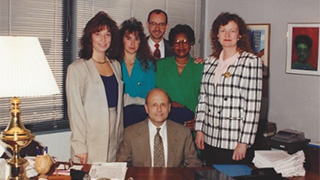
Nick as Director of the NJ DYFS with assistants Barbara Panebianco and Trish Gialella DePula, Special Assistant to the Director Chuck Cheeseman, Administrative Secretary to the Director Annie McLauglin, and Administrative Assistant Judy Muldoon.
For five years Nick worked at the OEO, then pivoted to New Jersey’s Division of Youth and Family Services ("DYFS"), first in the role of assistant director, then as director. DYFS intervenes in the most troubled family situations, often needing to provide family support services and, at times, having to separate children from their parents—a devastating ordeal for families and grueling on the social workers.
Nick got to work trying to improve conditions for both families and employees, but not without push-back from those in power.
In the East Orange DYFS office in the early ’90s the union was threatening to strike over poor working conditions. Nick told the commissioner he was going up there to see what was going on.
The commissioner warned strongly against it, but Nick told him he was going, anyway. "You have to go into the heat of the fire in order to extinguish the flames," he believed then, and believes to this day.
When Nick arrived in East Orange, the staff was startled. They never had a visit from a DYFS director before. He told them he was there to listen and promised to address their concerns. They came around to accepting and appreciating it.
Thereafter, Nick made it his routine to visit every office in the state at least once a year and have open discussions with the staff. Nick also established a director’s advisory committee made up of local office staff, and started a director’s memorandum that he would write himself. It was known as the "Dear Colleague" letter. Copies were given to every staff member directly, not through the chain of command.
"Based on my background and training in journalism, I slowly but surely changed the culture in DYFS to make it a more open environment that allowed the free exchange of ideas from staff at the lowest levels up to the top," recalls Nick.
One day, Nick received a highly unusual call from a judge. The call came directly from the bench, showing how seriously the judge took this matter. As Nick remembers it, Judge Carmen Ferrante of Passaic Juvenile Court said he had a case worker on the stand who claimed that children were being shipped out of state to residential treatment facilities instead of keeping them in New Jersey. He wanted Nick to come to his court and provide an explanation.
"Your honor," Nick replied, "I’m not going to do that because the casework decision-making rests at the local level. I will not overstep or overrule the judgment of my staff who are closest to the families and the kids."
Judge Ferrante said he was going to issue a subpoena. Nick had no intention of yielding.
The next day, Nick heard on the car radio that Judge Carmen Ferrante had issued a subpoena for DYFS director Nicholas Scalera. "I swerved off the road. I thought, 'Oh my God, my mother and my father are going to think I did something wrong!'"
Nick called his mother to alert her that she might hear something about him on the news, but reassured her that all was OK. Nick then called his cousin, an appellate court judge, for advice. His cousin told him that Judge Ferrante was reasonable and Nick should just go to his office.
"So, my staff sent me off with a little goodie bag to take with me to jail," Nick recalls. "They said, 'You’ll be fine; you’ll only be in jail a few days.'"
Nick remembers Judge Ferrante being warm and welcoming. Nick explained that the reason children were being placed out-of-state was because residential treatment facilities in New Jersey were reluctant or unwilling to take the most seriously disturbed youth.
"That’s what we have," Nick explained to Judge Ferrante. "They’re the most troubled kids coming from abusive homes and sexually abusive situations. I’d be happy to keep them in New Jersey if the facilities would agree to accept them."
Nick asked Judge Ferrante if he would use the powers of his office to help him do this. He agreed. The Judge convened a meeting of juvenile-court judges statewide and invited Nick to brief them on the situation. Nick was delighted to clarify any remaining concerns.
While at DYFS, Nick also found a way for incarcerated mothers to see their children.
"I did a search of the DYFS caseloads and discovered that many kids had mothers or fathers locked up in jail," Nick recalls. "What I found was horrendous. These parents never got to see their children grow up and the kids never got to see their mothers and fathers. This made no sense to me. So, I started a program to provide private bus transportation for these kids to visit their mothers in the Edna Mahan Correctional Facility for Women."
Nick said this did not sit well with the corrections commissioner, who accused him of churning up trouble.
"I’m sorry," Nick replied, "but I’m going to keep doing this until you lock me out." Nick knew that if the commissioner locked him out, it would be all over the papers. The bus trips continued.
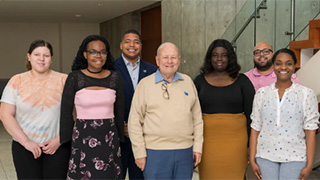
Nick with Scalera Scholarship recipients Nyada Bryant, Pamela Hernandez, Jason Santos, and Sabine Wancique.
All his life, Nick has been driven by an earnest desire to help the disadvantaged, and he believes his Seton Hall University education prepared him for success. That’s why he returned to his alma mater in 2007 (42 years after graduation) to establish the Nicholas R. Scalera ’63 Scholarship Fund to support Essex County youth who have substantial economic and social needs. Since the first grants were awarded in 2010, 72 Scalera scholarships totaling close to $140,000 have been distributed to 48 eligible students. Nick makes annual contributions to the fund, supplemented by donations from relatives, friends, and associates.
"Seton Hall has made enormous progress over the years," says Nick. "Once it was just a local diocesan college, but it has become a highly respected national university, a premier Catholic college. The growth has been incredible in the quality of its curriculum and extracurricular activities, as well as in the qualifications of its faculty, leaders, administrators, and students."

Nick showing his true colors as a "modern day" Pirate in Manhattan.
Nick believes alumni are the lifeblood of the university. "We are ambassadors, encouraging others to receive the same exceptional education we received at Seton Hall. We demonstrate the importance of giving back to the University that prepared us for the future."
Nick Scalera ’63 has done extraordinary things for people in need, including the next generation of Seton Hall students. We invite alumni who want to learn how they can give back and pay it forward, to contact University Advancement at [email protected] or (973) 378-9800.
Categories: Alumni


